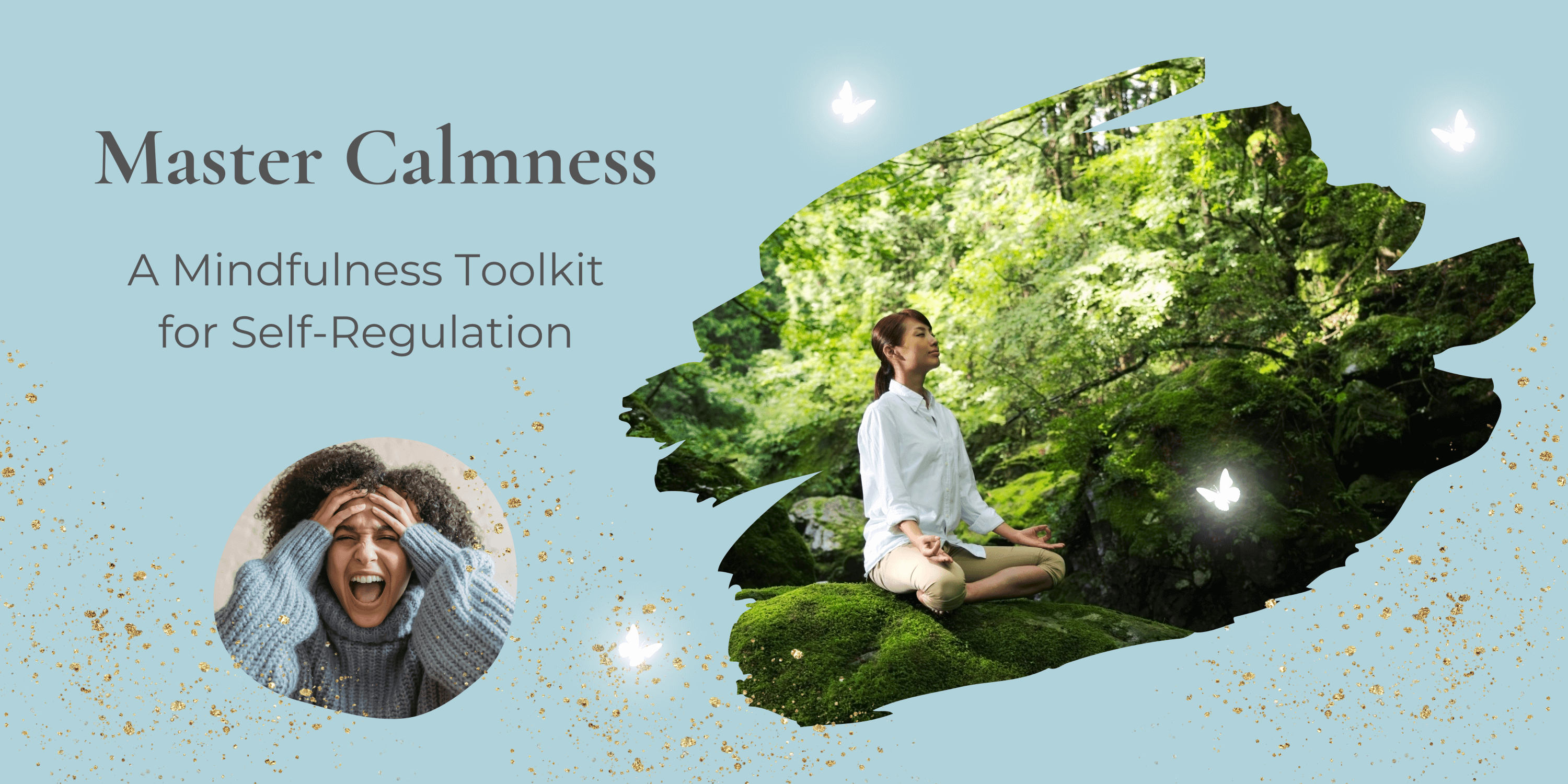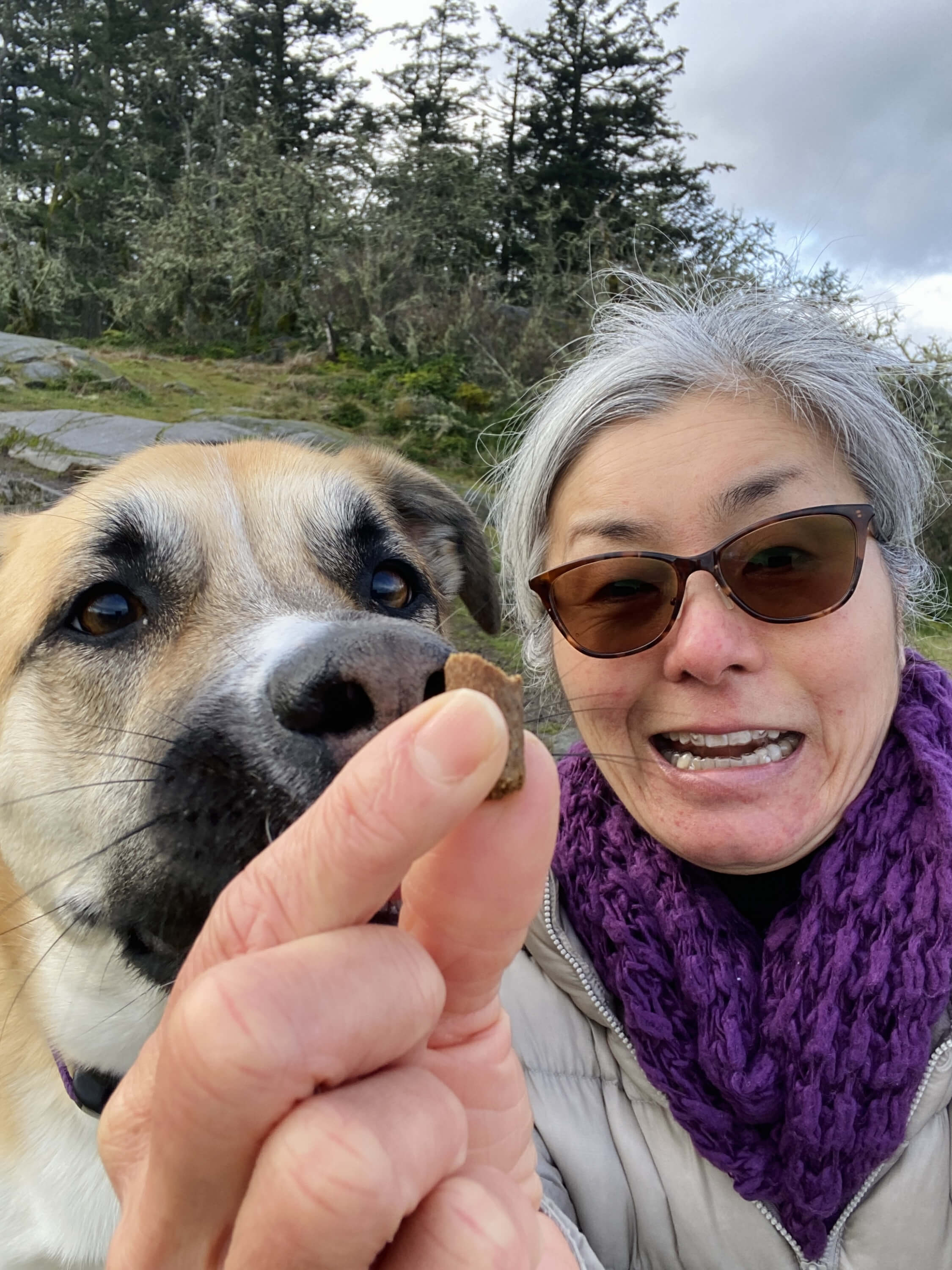
As a mom, I used to be the person whose thoughts raced at 100 miles per hour, leaving me utterly exhausted. I didn't know how to stop the overwhelming thoughts that spun around like a merry-go-round. If you are nodding along, I'm here to help you - in case you need one TODAY!
By the end of this article, you’ll know how to create your own Mindfulness Toolkit with 3 levels of self-regulation tools to help you stay calm, grounded, and present - no matter what life throws your way.
🌲🌲🌲
What's a mindfulness Toolkit?
Unlike physical tools, this toolkit is made up of the knowledge & skills you already have. It's designed to bring your focus back to yourself, assisting you with ups & downs more easily.
Consider this: constantly pulling your attention outward makes you lose control of yourself. Remember, a bird trusts its wings, not the branch it's sitting on. The most effective tools are already within you- you need to know they're there!
Recognizing signs of dysregulation
The Zones of Regulations is a fantastic guide for recognizing signs of dysregulation. It includes four zones: Blue, Green, Yellow, and Red to help identify our physical & emotional state. The Green Zone is where we want to be, and the Red Zone is where we want to avoid.
Self-awareness is the key to creating a one-of-a-kind toolkit that helps you ground yourself in the present moment. Let’s dive into making your own!
3 Levels of Strategies in Your Mindfulness Toolkit
Level 1: Easy
These strategies are quick & easy and can be applied anytime, anywhere, even while reading this article! Some examples of these strategies are taking deep breaths, drinking water, snacking, getting fresh air, stretching your body, taking a short walk, 10 pushups, and much more.
These simple actions can help you get back to the calm state, the Green Zone.
Level 2: Moderate
Moderate strategies require more time, creativity, and planning. These activities, which you enjoy, connect you with your authentic self. The key is cultivating your curiosity.
To help brainstorm ideas, consider:
- What do you enjoy doing?
- What makes you genuinely happy?
- When do you lose track of time?
- What are you naturally good at?
- Which one do you prefer, physical or interactive activities?
Some activities include gardening, hiking, dancing, cooking, reading, painting, swimming, exercising, and much more.
While these require more time and effort, they can be proactive self-care tools to stay or return to a calm state.
Level 3: Extreme
Now that you have some ideas, let's explore the final level of self-regulation tools - these strategies push you to step out of your comfort zone.
They will be challenging, but the reward is ginormous when you commit yourself to time, effort, or consistency. Activities like back-country camping, a variety of training, and cold-water plunging and swimming fall into this category.
There are times when you'll need these tools. They cultivate greater peace and resilience with consistent effort, helping you slow down and be present with yourself.
A little hack: Consider what makes you uncomfortable - the things you KNOW could benefit you or have always been curious about trying. Stepping out of your comfort zone shifts your focus on you. While these strategies demand discipline, their lasting effects on your ability to stay mindful make them incredibly worthwhile.

Conclusion
In conclusion, creating your one-of-a-kind mindfulness toolkit is not just about finding quick fixes; it's about cultivating a sustainable practice of self-regulation that helps you navigate daily challenges with grace and resilience. By understanding and utilizing the three levels of strategies—Easy, Moderate, and Extreme—you empower yourself to stay calm, even when the world seems overwhelming.

Many New Year's resolutions fade within a few months. Have you ever wondered why this happens so often? Two main reasons are lack of clarity & deeper purpose or meaning behind the resolutions we set.
If you're serious about positively changing your life this year, the following 12 transformative questions can help you craft New Year's Resolutions that stick. Let's dive in!
🌲🌲🌲
6 Questions to clarify your New Year's Resolution
Q1: Why do you want your goals?
Understanding your motivation is key. Consider what dreams or aspirations you have for the new YOU. Embrace your emotions, even if they're uncomfortable. They'll help you with resilience, especially when you're just about to throw the towel into the ring.
Q2: Is your goal achievable, considering where you are now?
Setting overly ambitious goals can lead to discouragement. Find a sweet spot: not too easy or too difficult. Next, reflect on your time and energy after work, family obligations, etc. Self-awareness is the key. Be honest with yourself and adjust your goals accordingly.
Q3: What emotions would you like to feel when you achieve your goals?
Visualization is a powerful tool. If you struggle with picturing the outcome, focus on your desired emotions. Close your eyes and let your body experience those feelings.
Q4: What obstacles might you face in achieving your goals?
While the thrill of achievement motivates, preparing for potential setbacks is crucial. What's your plan for tackling obstacles? Being proactive about challenges leads to success.
Q5: How will you measure your progress?
Defining a target number or timeframe gives you a clear goalpost. Clarity leads to a greater chance of success!
Q6: Who do you need to become to achieve your resolutions?
This reflective question is critical. Achieving your goals involves evolving into a better version of yourself. Describe three adjectives that embody the person who fulfills your New Year's resolutions.
6 Questions to Maintain Your New Year's Resolutions
Q7: How will you remind yourself to take action?
Research shows that forming new habits takes 18 to 254 days to become automatic. Find an undeniable reminder to ensure you won't make excuses for forgetting. What do you look at regularly that can prompt you?
Q8: Who or what holds you accountable?
Having an accountability partner or making yourself accountable to someone or something increases your likelihood of sticking with your plan. It motivates you to act even when you don't feel like it.
Q9: What will trigger for you to take action?
In "The Power of Habit," it's explained that introducing a new habit is easier when you build it on an existing one. For example, after dinner (an existing routine), you could take a walk (a new habit).
Q10: When and where will you take action?
Set a specific time and place for your actions, aligning them with your routine for the least friction. This specificity reinforces consistency. For example, I do strength workouts in the kitchen while I cook instead of going to the gym.
Q11: What reward will you give yourself for taking action on your New Year's resolutions?
To encourage consistency, incorporate fun and motivation into your plan. Rewards can be tangible items, experiences, or fulfilling emotions. You'll evolve, and so will your reward. What would inspire you to keep pursuing your resolutions?

Q12: How often will you check your progress and adjust if necessary?
It is essential to track your progress and celebrate small wins regularly. Decide whether daily, weekly, or monthly check-ins work best for you, and celebrate each milestone along your journey!
Conclusion
In conclusion, these 12 questions serve as your guide to meaningful New Year's Resolutions that stick! Embrace them with intention and an open heart. With clarity and purpose, you have everything you need to step into the new year confidently. Visualize your growth, commit to your dreams, and make this your most transformative year yet! Remember, the best part of your life is ahead of you!

In the hustle and bustle of mid-life, balancing family and work can often leave you feeling stuck in the daily grind. Amid this chaos, finding moments of peace and joy might seem impossible. However, a gratitude journal can serve as a transformative tool to reconnect with yourself and uncover positivity and fulfillment in everyday life.
A gratitude journal is simply a record where you jot down things you're thankful for, fostering reflection and appreciation. Whether you choose a high-end journal or a simple notebook, the goal remains the same: to focus on the positives in ordinary moments. This practice offers numerous benefits, from increased creativity and reduced stress to a greater sense of purpose and improved physical health.
The best time for journaling depends on your routine—consider evening sessions to end your day on a positive note, morning entries to start your day right, or jotting down thoughts throughout the day whenever gratitude strikes. Prompts can help get you started by focusing on connections with yourself, nature, and others. Over time, this habit can shift your mindset from negative to positive, bringing more happiness into your life. So grab that notebook, make a cup of tea, and start your journey to a more grateful and joyful self today.
Read more...
Peace of mind often escapes our thoughts as mothers until we notice it impacting our mental well-being. The stress of parenting, managing daily tasks, and the constant feeling of being pulled in every direction can leave us feeling anxious, irritable, and impatient.
If this resonates with you, rest assured, you are NOT alone. Many of us juggle endless tasks for the benefit of others, only to end each day feeling utterly drained. Yet, we persist, telling ourselves to push forward. However, this cycle of relentless effort without a moment for ourselves can quickly lead to burnout. Like so many, my desire to be the perfect mom and provide the best for my family led me down an unsustainable path that negatively affected my mental health. I felt stuck and unsure of how to break free.
The wake-up call for many of us came with the pandemic, forcing us to reevaluate our priorities and slow down. During this period, I had an epiphany; aiming to be a peaceful mom was far more valuable than striving for perfection. This realization led me to discover *The 5 AM Club* by Robin Sharma, a book that taught me the importance of taking control of my mornings and, by extension, my peace of mind.
Why Embrace a Morning Routine for Peace of Mind?
Adopting an early morning routine, as suggested in this *The 5 AM Club*, offers countless benefits for mental transformation. The essence of waking early is the precious, undisturbed time it affords you before the demands of family life begin. This is not about waking up early to meet the needs of others, but to focus on nurturing your mind, soul, and body.
Steps Towards Crafting a Peaceful Mind
Embarking on my 5 AM journey began with small, manageable changes. The first step was eliminating my afternoon coffee, which, though a tough habit to break, led to noticeable improvements in my well-being. Encouraged by this success, I gradually adjusted my wake-up time from 7 AM to eventually 5 AM, despite the initial challenge and sleep-deprived days this change presented.
Creating Your Personal Morning Routine
While reading *The 5 AM Club* is something I highly recommend, I understand the constraints of a busy schedule. To help, watch this video summary of the book's key ideas. Before you dive into the video, make sure to have a pen and paper ready to jot down insights that could guide your journey towards a peaceful mind.
The book suggests dividing your first hour into three 20-minute blocks for exercise, reflection, and personal growth. This structure is a great starting point, though I encourage you to tailor it to suit your needs. For instance, my routine shifts between seasons, currently comprising a 15-minute walk, 25 minutes of yoga and meditation, and 20 minutes of learning. The key is to focus on what you are capable of doing each day, considering factors like the weather, your living environment, and any physical limitations.
The Result: Transformation for a Peaceful Mind

On July 11th, 2020, I began a journey that transformed my life—waking up at 5 am. Initially, it was a challenge, but with time, the early mornings became a cherished part of my routine. Roughly a month into this new habit, I noticed profound changes in my mentality, akin to becoming an entirely new person.
Recently, I stumbled upon an article that echoed the transformation I've been experiencing. This article resonated deeply with me, as it outlined various internal shifts similar to my own:
1. Taking responsibility for my actions – Previously, I had a tendency to blame others.
2. Adopting a growth mindset – I moved away from a victim mindset, embracing positivity instead.
3. Setting healthy boundaries – I learned to distance myself from toxic environments and individuals.
4. Gaining control over myself – In the past, I wrongly sought control over others, which was detrimental.
5. Finding calm and peace within – Anxiety, irritation, and impatience used to be my constant companions.
6. Cultivating awareness of myself and others – I had been too preoccupied to notice the world around me.
7. Focusing on being a peaceful mom – I let go of the unattainable goal of being the perfect mom.
Embarking on this journey has fortified my mental strength, granting me a serene and relaxed disposition. When you're relaxed and self-aware, you hold the reins of your life. Discovering and maintaining a peaceful mind has been the cornerstone of my transformation.
Love & Care💕
Kumiko














